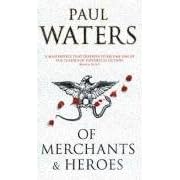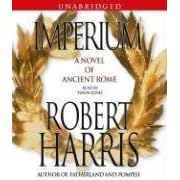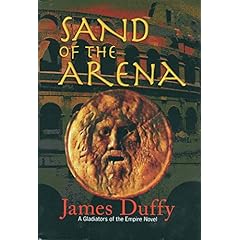
I was recently asked by Cambridge University Press to review "Rome's Gothic Wars: From the Third Century to Alaric (Key Conflicts of Classical Antiquity) by Michael Kulikowski. I finally got a chance to begin reading it and find it clearly written and thankfully devoid of the stilted academic jargon that pervades many history texts. As most
of my studies have focused on the Roman Republic, I am learning all kinds of fascinating things about this later period.
For example, I did not realize that there were reports of cannibalism
inside the city of Rome during Alaric's siege. Kulikowski also
postulates that one of the stimuli for the beginning of Gothic
invasions of the Empire was in response to Caracalla's granting of
citizenship to all free residents of the empire. He felt that this
action opened up the possibilities for anyone - not just provincial
elites who had gained senatorial rank - to gain the throne.
Evidently, Mr. Kulikowski has another problem with Caracalla. He says in his opinion, much of the civil unrest in Rome itself resulting from the long string of
assassinated emperors was triggered unwittingly by Caracalla when he defeated the last Parthian king. This left a power vacuum in the east that was filled by the much more problematic (for the Romans)Sassanids who were not content to control the former Parthian Empire but launched numerous incursions into Roman territory. Less successful responses to these incursions would often result in deposition of the
current emperor. Likewise, success would bring a new challenger to the imperial throne.
He also went on to describe the problems created by Roman interference
in Barbarian tribal control with Roman subsidy of particular tribal
leaders. Although this may have brought temporary loyalty, ultimately
it garnered a larger core of support around these subsidized
chieftains who would then be in a position to challenge the authority
of Rome itself along the frontiers. He pointed out that Decablus was
just such an example. The Romans initially subsidized his power base
in Dacia.
I found an article that described how this came about:
"In 60 BC, King Burebista of Dacia began a series of expansionistic
moves to relieve pressure from nomadic incursions, which eventually
threatened Roman Danubian and Black Sea territories. Julius Caesar
began to lay plans for a campaign in Dacia and Partha, which came to
naught when both Caesear and Burebista were assassinated in 44 BC.
Later, during the reign of Nero (54-68 AD), Dacian raids into Roman
Moesia became so serious that the Romans engaged the Roxolani to help
defend their frontier, thus placing Dacia's sometime Sarmatian allies
on their enemies list.
In 85 AD, King Decebalus assumed the Dacian throne, adopting a hostile
Roman policy that posed a serious challenge to the Emperor Domitian
(81-96 AD). A Dacian army raided across the Danube into the Roman
province of Moesia, killing the Roman governor and looting the
countryside. This prompted an retaliatory expedition under command of
praetorian prefect Cornelius Fuscus that was wiped out in eastern
Dacia (including the loss of Legio V Alaudae) . A second Roman
expedition was severely defeated in 87 AD.
Finally, a Roman army under Tettius Julianus defeated the Dacians at
Tapae in 88 or 89 A.D. King Decabalus of Dacia was forced to pay
tribute and allow Roman armies passage through Dacian territory.
Domitian, however, was distracted by Saturninus' Revolt on the Rhine
Frontier and uprisings by the Sarmatian Iazyges, Marcomanni and Quaid
tribes on Rome's Pannonian frontier. He sought the favor of Decabalus
to avoid a Dacian-Sarmatian alliance, offering skilled artisans and
hostages to ensure Dacian neutrality while he contended with his other
headaches." - DBA Resource
(
http://www.fanaticus.org/DBA/armies/dba68.html)
I couldn't help but think that we certainly didn't learn much from
these Roman experiences in political interference since we so recently
repeated their mistakes!
Kulikowski, also pointed out something that is important to know if you are
reading original historical sources from the period. He says that,
even though the Goths contemporaries referred to them as Goths,
historical scholars of the day used the formal designation "Scythians"
because the Goths had originated north of the Black Sea in the same
region once occupied by the true Scythians recorded by Herodotus.
I also found little controversies pointed out by Michael Kulikowski quite interesting.
He appears to be very skeptical of Jordanes narrative of the origin
and migration of the Goths from Scandanavia to the Black Sea region
("Getica"). Supposedly, Jordanes sixth century account was based on
the lost barbarian histories by Cassiodorus. But Kulikowski maintains
that Jordanes work was prepared while attached to the court of
Theodoric so he feels it was meant to provide a glorious history of
descent for that monarch and can't be solely relied upon when no other
sources are available - much like the skepticism that always surrounds
the narratives by Suetonius.
He went on to say that the connection between the Goths and
Scandanavia has been disproved archaeologically but did not elaborate
on how. He feels the Goths arose as a result of barbarian
relationships with the Roman army along the frontiers in the third
century and that they did not exist as a recognizable cultural group
before that time.
Kulikowski, also observed that Constantine apparently deliberately shifted from the former emperors' claims to be descended from Hercules to claim a descent from Claudius Gothicus. The author seemed to think this was a way to demonstrate a rejection of pagan philosophies. Richard D. Weigel of Western Kentucky University seems to support the observation that any connection with Claudius Gothicus was a fiction:
"M. Aurelius Claudius, known to history as Claudius Gothicus or Claudius II, was born in either Dalmatia or Illyria on May 10, probably in A.D. 213 or 214.[[1]] Although the most substantive source on Claudius is the biography in the Scriptores Historiae Augustae (SHA), this account is riddled with fabrications and slanted with fawning praise for this particular emperor, who in the fourth century was viewed as an ancestor of Constantine's father and thus of the ruling imperial family. This biography, attributed to one Trebellius Pollio, must be read with extreme caution and supplemented with information from other sources, including Aurelius Victor, the Epitome de Caesaribus, Eutropius, Orosius, Zonaras, and Zosimus, as well as coins and inscriptions." -
De Imperatorabus RomanisAlthough his reign was short, Claudius Gothicus did appear to be an emperor worth emulating:
"The Gothic challenge in 269 proved to be the greatest that Claudius II would face. The Goths assembled a large invading force, reportedly amounting to 320,000 men transported on a fleet of at least 2,000 ships, and first attacked coastal cities along the Black Sea in Moesia. After passing into the Aegean the Goths besieged Thessalonica. At this point, in 269, Claudius left Rome to stop the invasion. The Goths then sent the larger segment of their troops on land toward the Danube, while the fleet took the remaining group to continue the naval attack on Aegean coastal cities. Claudius sent Aurelian's cavalry to Macedonia to protect Illyria from attack, while he commanded the forces blocking the route to the Danube. In the area of Doberus and Pelagonia, the Goths lost 3,000 men to Aurelian's cavalry. At Naissus in Moesia, Claudius' force succeeded in killing some 50,000 Goths. There were follow-up operations on both land and sea, but the Gothic War had essentially been won.[[34]] Staving off the attacks of the Goths was a major contribution to the survival of the Roman Empire. It was a significant step leading to the subsequent success of Aurelian and the resurrection of the Empire under Diocletian and Constantine. When the Goths eventually succeeded in taking parts of the western Empire in the fifth century, their disruption to the course of civilization was likely much less violent than it would have been had they succeeded in the third century.
In addition to bad weather, a lack of supplies, and hunger, plague was a major factor in the defeat of the Goths. Many of the Gothic prisoners were either impressed into Roman military service or settled on farms as coloni. [[35]]Claudius received the title Gothicus in recognition of his triumph over the Goths. At some point he had also been given the title Parthicus, but the unlikelihood of any conflict with the Parthians in his short reign makes this difficult to explain. Perhaps Damerau was correct in his suggestion that a Parthian unit may have been involved in one of the battles with the Palmyrenes, although on this front there were few achievements to claim.[[36]] In any case, Claudius' victory over the Goths was short-lived. The emperor himself caught the plague and died at Sirmium early in 270. He was 56 years old.[[37]] Claudius' brother, Quintillus, became emperor briefly before losing out to Aurelian. Claudius also had another brother, Crispus, and the SHA traces the link to Constantius through Crispus' daughter Claudia.[[38]]
The Roman Senate showed its respect for Claudius Gothicus by setting up a gold portrait-shield in the Curia and by approving his deification. He was also honored with a golden statue in front of the great temple of Jupiter Optimus Maximus and a silver statue set on a column on the Rostra.[[39]]"
All of these issues prompted me to seek out other academic opinions and more information.
Judith Weingarten, who studied classical archaeology at Oxford and is a member of the British School of Athens, disagreed with Kulikowski's suggestion that Caracalla's granting of citizenship to all free residents was a crucial trigger to the Gothic migrations:
"Caracalla's father, the Emperor Septimius Severus, had already started the rot: as the first of the Soldier Emperors, he came to power over the bodies of three emperors (all murdered in a single year!) and fought two bloody civil wars against rival generals to boot. He was, however, the last emperor, for a very long time, to die in bed. For the next 60 years, emperor after emperor - and there were many - fell to the assassin’s knife - and that is only to speak of the so-called legitimate emperors, who managed to fight off and kill their rivals - the losers then being called ‘usurpers’ or ‘pretenders’. [An old English jingle makes the point:
Treason doth never prosper/ what’s the reason?/ For if it prosper/ none dare call it treason.] Caracalla’s murder, in turn,, did usher in a new age of instability. Legitimacy gave way to force and absolute depotism, in which the losers, their friends and supporters, were slaughtered and their property confiscated.
In my opinion, the true reason for Caracalla granting citizenship to all free men in the Empire, was his need to raise revenue: in return for citizenship, he taxed them. When even that was insufficient, he debased the currency...."
Another historian, Volker Carlton Bach of Denmark, took issue with the speculation that Constantine's rejection of the emperor's traditional descent from Hercules was a demonstration of rejection of pagan philosophy.
" I think this is based on a misunderstanding. The descent of the Herculian
Emperors (not the Jovian ones) from Hercules was purely a notional, cultic
(for want of a better word) concept. The closest we have today, I think, is
the link between the popes and St Peter - not an arogation of genetic
descent, but a claim of spiritual successorship and close association. The
Romans knew that Maximian and his successors were not the
great-great-great-repeat ad nauseam-grandsons of the heros Hercules. After
all, they had real mothers and fathers, and in some cases even knew both with
a degree of certainty. The descent claim from Claudius Gothicus, on the other
hand, *is* a 'real' paternity claim, similar to the adoption of Antonine
nomenclature by third-century emperors. So Constantine doesn't really
replace one claim with another. The Herculian designation was unnecessary
simply because with Constantine's victories, as it had been used to
distinguish junior colleagues from senior (Jovian) ones. Constantine was
*the* emperor, so that was that. Claudius Gothicus, on the other hand, was a
very attractive ancestor to claim, a successful and legendary warrior and,
unlike Aurelian or Diocletian, without anti-Christian baggage."
Any book that can generate this type of quality discussion is a worthy addition to any history enthusiast's collection. I notice it is one of a series of introductory-level texts exploring the key conflicts of classical antiquity. I look forward to reading others in this series.






 Once more, Harris delves into the inner workings of the Roman Empire only this time, he retreats back to the Republican era and creates a fictional biography of Marcus Tullius Cicero as seen through the eyes of his slave secreatary, Tiro.
Once more, Harris delves into the inner workings of the Roman Empire only this time, he retreats back to the Republican era and creates a fictional biography of Marcus Tullius Cicero as seen through the eyes of his slave secreatary, Tiro.



 by Steven Saylor
by Steven Saylor


